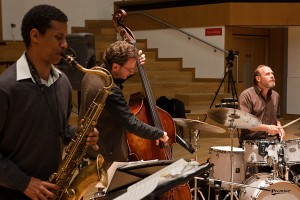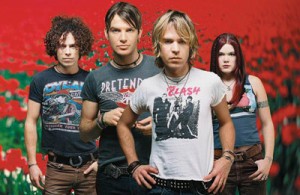GRAHAM PARKER’S COUNTRY COMFORTS
This feature appeared in Amplifier Magazine, January 2004
"A sort of mercenary feeling crept in" confides Graham Parker from his American home in upstate New York. Ruminating on the current state of pop culture, Parker has developed his own acerbic theory as to why things are the way they are: novelty has become more important than substance. "So why not do myself a favor?" he shouts. "I'll surprise the media. They'll probably figure 'oh look, he's gone country! We'd better write about him! We'd better have him on our show!" In keeping with his legend, Parker lowers his voice and adopts a decidedly cynical posture. "How can I fool all those bastards?"
The good news is Graham Parker isn't really intending to fool anyone. He certainly has not abandoned his iconoclastic pop sensibilities. And he's in very good spirits these days. Parker's latest release, Your Country, is a deliberate foray into roots music with a rock 'n' roll heart. The East London born recording artist and author continues his impressive thirty year streak of stinging social commentary, melodic craft, confessional word-play, and passionate performances with healthy dose of piss and vinegar.
Typecast as an "angry young man" at the onset of the 1970s punk explosion, Parker's early records with The Rumour, the UK's premier pub-rock ensemble, produced a stunning series of R&B meets power-pop classics Howlin' Wind (1975), Heat Treatment (1976), Stick To Me (1977) and his most recognizable effort Squeezing Out Sparks (1979). Mid-career gems such as Another Grey Area (1982) and The Mona Lisa's Sister (1988) solidified Parker's reputation as a pop music force possessing the lyrical brilliance of Bob Dylan meshed with the unkempt rock 'n' roll swagger of the Rolling Stones. By the 1990s Parker emerged as a respected elder statesman via mature works including Human Soul (1990), Struck By Lightening (1991) and Deep Cut To Nowhere (2001), exploring domestic life and mortality.
The organic impetus of Your Country, titled in part as homage to the Beatles' White Album track "Yer Blues" is a no-brainer. "The country influence has always been there in my music," emphasizes Parker. "I was going to call it Yer Country but Americans would probably miss the British slang…though I can't stand the thought of a DJ announcing "Yourrrrrr Country."
It is a natural progression for Parker as well. "I much prefer acoustic music to play and listen to. My voice is suited to these kinds of songs. I can still rock with the best of them, but I cannot sing in that upper mid-range that I used to. Besides, that's something a younger man should be doing." Parker does not rule out making another rock album in the foreseeable future. "I could have done these songs in the typical GP format: a mish-mash of rock, folk, reggae, and soul. And then you'd have people saying 'ho hum, he's done another one."
Your Country could not have appeared without the collaboration of fellow singer song-writer, bassist, and multi-instrumentalist Tom Freund, whom Parker describes as the best musician on the planet without a record deal. Freund, who garnered acclaim as a solo recording artist and as a member of the Silos, led Parker to a tiny sixteen track studio in Venice, California and enlisted former Lone Justice drummer Don Heffington to round out a trio. With four hours of rehearsals and a little over a week in the pits, Parker and company cut at a rapid pace, nailing five songs on the first day of recording. Parker brags "we did every song no more than twice. Ever since I started producing myself on Mona Lisa I've been trying to get my vocals recorded live. All these producers that were costing me 50K were doing the wrong thing with my voice, forcing rough scratch vocals, and then asking me to come back two months later to give them a final take. That's totally unnatural." Your Country is Parker's finest hour as a singer. "I ordered the engineer to leave the vocals dry, which is a gutsy move for me."
Enter Lucinda Williams. The reigning queen of alternative country opened on Parker's 1992 tour as her Sweet Old World album was breaking into the mainstream. While composing the tune "Cruel Lips" Parker envisioned a duet with Williams, but dismissed the idea due to logistics. During a session break Huffington mentioned that he'd played on Williams' recent Essence tour and kept her number. Williams was in town and gladly agreed to come to the studio to help an old friend. "Her voice is kind of naughty. My knees turned to jelly whenever she sang the word 'lips.' I couldn't take it. I had to walk out of the room." But Parker kept poking around the hallway. "I'd come back in to just make a comment, and Lucinda would admonish me 'no Graham! We're not in that part of the song.' Ok sorry, I'll leave it to you then. Fucking great!" Parker loathes the idea of inviting guests to boost his commercial visibility. "That pleases the record company, and that's the last thing I want to do. I'd rather piss 'em off than make them happy." After a pregnant pause, Parker calms down "I did it because it was the real thing to do."
The cool reading of the Jerry Garcia classic "Sugaree" emanates from Parker's numerous solo acoustic shows over the past two decades. When he first heard the Grateful Dead in the psychedelic era, he dismissed the band as "lame country," though Parker did find merit in Garcia's solo debut. "I loved 'The Wheel,' 'Deal,' and 'Sugaree.' I crudely taped those three tracks from a Deadhead friend. The cassette was at my parents' house until a few years ago. Whenever I visit, I pull something out of the drawer in my old room and shut it quick so there's always a surprise when I come back. I found the tape and instinctively knew what was on it." That tape consequently fell to pieces after Parker learned the tune.
Another classic, Parker's own "Crawling From The Wreckage," a huge hit for Dave Edmunds, returns on this collection as a hillbilly rave-up. "Nation Of Shopkeepers" affords Parker yet another chance to pine autobiographical. "I think the title came from Churchill. The song captures that small-time lack of ambition that we British are known for. I come from a nation where we're supposed to be satisfied with our lot in life, and not do what I did."
From the man who railed against the machinations of a homogenized rock music industry with such vitriolic diatribes as his 1979 FM radio hit "Mercury Poisoning," a parting shot at his old label, Parker has no plans to pen a blow by blow account of his ups and downs in the business. His comedic novel, The Other Life Of Brian, a fictional romp detailing a year in the life of a musician who tours obscure places such as the Arctic Circle and Tasmania, boarders on reality. "I can deal the most sharp observations on paper by writing in fictional terms" he laughs. "It allows me more latitude." On GrahamParker.Net, Parker fields questions about life in music and why it's incomprehensible and completely unaffordable to reunite the Rumour, even for a one off gig. "I love to bust myths and explain to people in great detail about how much the music business sucks! I think that's a lot of fun."
Parker admits that he's not up to snuff on new music, nor does he feel out of step. His nineteen year old daughter recently wrote a college thesis as to why rock music is not as good as it used to be. She also asked dad to buy her a copy of Bob Dylan's Blood On The Tracks and is currently mesmerized by David Bowie's The Rise and Fall of Ziggy Stardust and the Spiders From Mars. "I saw the latest issue of Amplifier online with Air on the cover. I thought 'wow,' what's going on in the world? People are actually giving credit to French musicians!' I must be well out of touch!"


